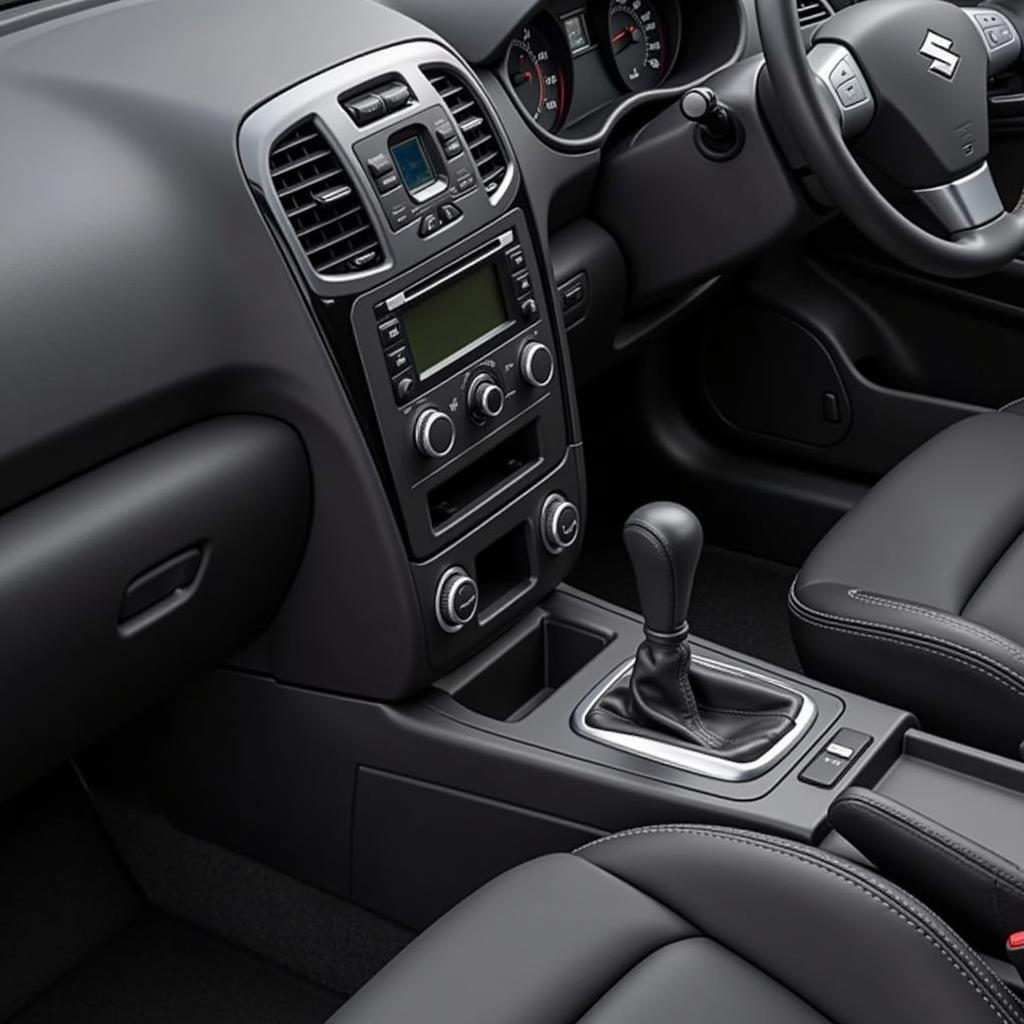Your cart is currently empty!

Suzuki OBD2 Scanner: What You Need to Know
Choosing the right OBD2 scanner for your Suzuki can feel overwhelming with so many options available. This guide is here to make your life easier. We’ll delve into everything you need to know about Suzuki Obd2 Scanners, from understanding their basic functions to choosing the perfect one for your needs.
Understanding Your Suzuki’s OBD2 System
Every gas-powered Suzuki manufactured after 1996 and diesel model from 2004 onward features an OBD2 port. This port, often located under the dashboard on the driver’s side, serves as your car’s communication hub for diagnostics.
An OBD2 scanner acts as a decoder for this communication, translating the technical jargon from your car’s computer into understandable information. This data allows you to identify the source of that pesky check engine light, monitor engine performance, and even analyze fuel efficiency.
 Suzuki OBD2 Port Location
Suzuki OBD2 Port Location
Why You Need a Suzuki OBD2 Scanner
While professional mechanics utilize high-end scanners, a personal OBD2 scanner empowers you to take control of your Suzuki’s maintenance and diagnosis.
Here’s why:
- Decode the Check Engine Light: That glowing orange light doesn’t have to remain a mystery. An OBD2 scanner reveals the specific OBD2 codes Suzuki is throwing, helping you understand the issue and its severity.
- Become Your Own Mechanic: For simple fixes, an OBD2 scanner can guide you, saving you time and money at the mechanic.
- Monitor Vehicle Health: Regularly checking your Suzuki’s data can help identify potential issues early on, preventing costly repairs down the line.
- Enhanced Driving Experience: Some advanced scanners offer real-time data on parameters like speed, RPM, and fuel consumption, enabling you to optimize your driving habits and improve fuel efficiency.
Types of Suzuki OBD2 Scanners
Choosing the right scanner depends on your needs and budget. Let’s explore the common types:
- Basic Code Readers: These entry-level scanners are budget-friendly and read & clear basic engine codes. They’re ideal for casual users looking to understand the check engine light.
- Bluetooth Scanners: These connect wirelessly to your smartphone or tablet, offering a user-friendly interface and a broader range of data points.
- Advanced Scanners: Designed for professional mechanics or car enthusiasts, these comprehensive tools provide in-depth data, live sensor readings, and advanced diagnostic functions.
Choosing the Best OBD2 Scanner for Your Suzuki
Consider these factors when selecting a scanner:
- Compatibility: Ensure the scanner explicitly states compatibility with Suzuki vehicles.
- Features: Determine what data points matter most to you, whether it’s basic code reading or live sensor monitoring.
- Ease of Use: Opt for user-friendly interfaces, especially for beginners. Bluetooth scanners with mobile apps generally offer intuitive experiences.
- Budget: Set a realistic budget and explore options within your price range.
Common Suzuki OBD2 Codes
While a scanner translates codes, knowing what they mean is crucial:
- P0420 OBD2: Indicates a potential issue with the catalytic converter.
- P0171 OBD2: Signals a lean air-fuel mixture, often caused by a vacuum leak or faulty oxygen sensor.
- P0300 OBD2: Indicates random engine misfires, requiring further diagnosis to pinpoint the exact cylinder(s) affected.
Remember, this is not an exhaustive list. For a complete understanding of Suzuki OBD2 codes, refer to your owner’s manual or consult a trusted mechanic.
Expert Insight
“Investing in a reliable OBD2 scanner is a smart move for any Suzuki owner,” says John Miller, a veteran mechanic with over 20 years of experience. “It not only empowers you with knowledge but can also save you significant expenses in the long run by catching potential issues early on.”
Conclusion
A Suzuki OBD2 scanner is more than just a tool; it’s a gateway to understanding your vehicle’s health. By making an informed choice and understanding the data at your fingertips, you can take control of your Suzuki’s maintenance, avoid unexpected breakdowns, and ensure optimal performance for years to come.
FAQs
Q: Can I use any OBD2 scanner on my Suzuki?
A: While most OBD2 scanners work on most vehicles, it’s crucial to choose one that explicitly states compatibility with Suzuki vehicles.
Q: Do I need a professional mechanic to use an OBD2 scanner?
A: Not necessarily. Many scanners are designed for user-friendliness, and you can easily find guides and resources online.
Q: Can an OBD2 scanner fix my car?
A: An OBD2 scanner primarily diagnoses issues. While it can guide you through simple resets, it doesn’t perform repairs.
Q: What should I do if the check engine light comes on after clearing codes?
A: It suggests the underlying issue persists. It’s crucial to have your Suzuki inspected by a qualified mechanic.
Q: Can I leave my OBD2 scanner plugged in all the time?
A: While it’s generally safe for short periods, prolonged connection can drain your car battery.
Need Further Assistance?
For more information about specific Suzuki models and their OBD2 systems, explore our detailed guides:
- OBD2 Suzuki Grand Vitara 2000
- Suzuki Grand Vitara Can Power Up OBD2
- OBD2 Scanner for Japanese and European Vehicles
For personalized support and expert advice, contact our team via WhatsApp: +1(641)206-8880 or Email: [email protected]. We’re here to assist you 24/7.

Leave a Reply